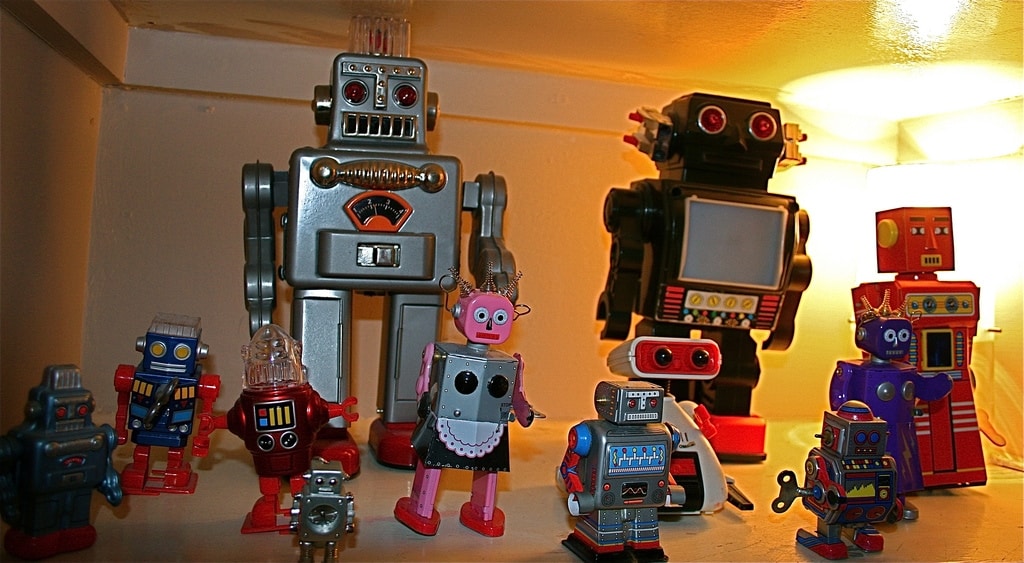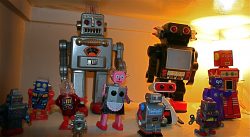Robot & Computer Copyright is Not Such a Dumb Idea, and It’s Also Not What the EU Proposed


Unless you are really into following the nitty-gritty details about Google’s self-driving cars and the potential legal conundrums, it’s rather dry stuff.
But you wouldn’t be able to tell that from some of the coverage. Techdirt, for example, twisted the couple sparse paragraphs which addressed copyright and and computer-generated content into this clickbait:
It’s a good thing to think about the technology of the future. Especially if you’re politicians and the future may have a big impact. Considering how frequently we see politicians ignore future technological change, it might be encouraging that the EU Parliament is at least considering what happens when our new robot overlords enslave us. Except that the report that the EU Parliament has come out with… is ridiculous. Most of the headlines are focusing on the ideas raised around making robots "electronic persons" for the purposes of paying social security or taxes, but the part that gets me is the plan to give them access to copyright as well.
While that sounds ridiculous, it’s not at all what the report said. Instead, what we have here is an example of why you should read the original source, and then go get a second opinion.
Here’s what the report actually recommends with respect to copyright:
The resolution calls on the Commission to come forward with a balanced approach to intellectual property rights when applied to hardware and software standards and codes that protect innovation and at the same time foster innovation. Moreover, the elaboration of criteria for "own intellectual creation" for copyrightable works produced by computers or robots is demanded. The current insufficient legal framework on data protection and ownership is of great concern due to the (expected massive) flow of data arising from the use of robotics and AI.
My take, and I also ran this by an IP lawyer, was that the report merely recommends that everyone come to an agreement on what the new laws will be.
The report does not take any position, nor does it advocate giving AI control of their copyrights.
This is not a monkey selfie case, but instead a rather bland report which doesn’t say anything more interesting than raising the idea that robots might be assigned the legal status of electronic persons.
That is a new term, yes, but if you think corporate personhood, not citizenship, you’ll get closer to the point than the clickbait coverage in Fortune or CNN.
I know a lot of people are inclined to point and laugh, and I would too if it were at all ridiculous. But frankly, the copyright question does need to be answered.
The UK is one of the few countries which has already decided the issue of whether computer-generated content can even be copyrighted (yes, but only for 50 years). That is an undecided question in the US and much of the rest of the world, which is why this report was drafted.
As I pointed out in 2013, wouldn’t you like to know whether the output of a bot like Automated Insights' Wordsmith was under copyright?
In the case of Wordsmith, the bot doesn’t actually write anything. Instead, it inserts facts into a template which was created by a human, and so the human would hold the copyright on any content created using the template.
But Wordsmith is just a simple bot, while a more sophisticated program could write content from scratch. That is going to create legal issues, and this report was drafted to get the issues resolved (hopefully) before they end up in court.
So no, there’s no reason to guffaw at this report.
Next!
image by jimbotfuzz
Comments
Joaquin Padilla Rivero June 29, 2016 um 9:23 am
What is a reason to guffaw is the fact that we’re discussing "electronic personhood" when each and everyone of those persons is going to be controlled by human beings, usually those with power over other flesh-and-bone people. Personhood implies autonomy, which is not what a media corporation in control of content-creating bots would desire. Content-creating bots who would be the supposed copyright holders would be programmed in such a way that they’d surrender their copyright in perpetuity to the corporation.
Nate Hoffelder June 29, 2016 um 9:59 am
I think the media orgs would like legal autonomy, actually.
Autonomy means that if the bot infringes, they can’t be sued. Or of the bot defames, they can’t be sued.
Joaquin Padilla Rivero June 29, 2016 um 10:08 am
But in order to defend themselves via autonomy, they’d need to prove that the bot is entirely autonomous and self-determined. Given that we already have living organisms with minds of their own which are self-determined and we still are responsible for their acts (pets, animals under our watch) I’d argue that a mass of human-made source code and human-made hardware can not be seen as autonomous.
Nate Hoffelder June 29, 2016 um 10:22 am
Except we’re talking legal autonomy, not independent actions.
In the same way that an LLC shields its owners from some liability, giving a bot legal autonomy would shield its owners from liability for its actions.